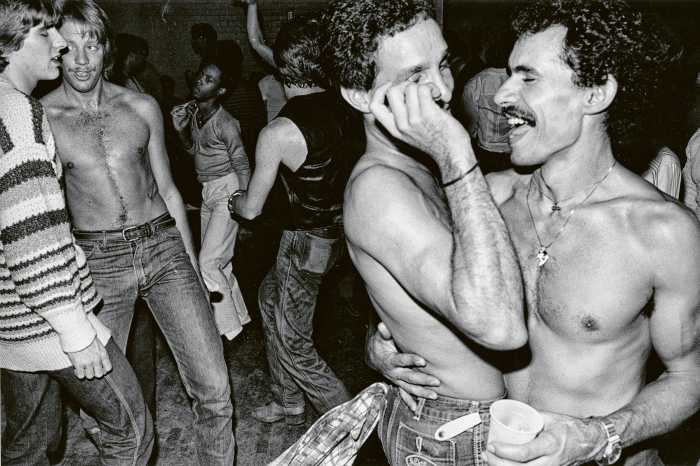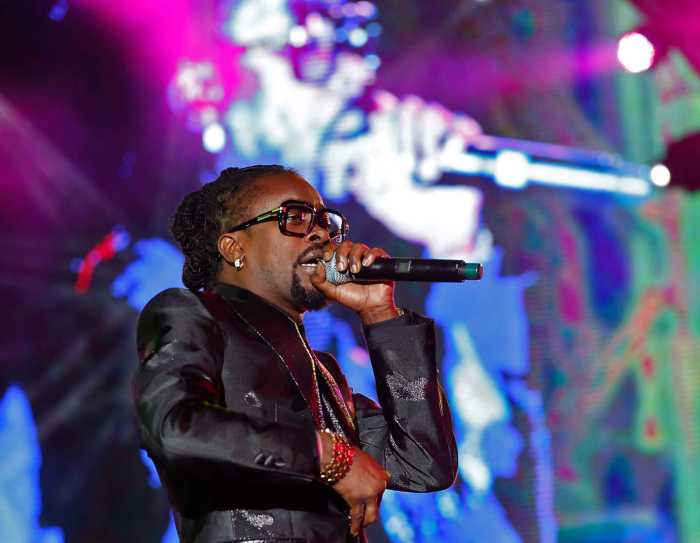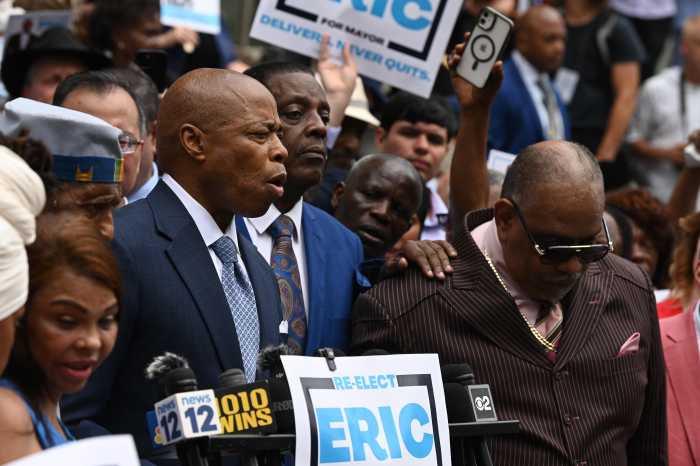Martin Duberman — Marty to his legions of fans, friends, and former students — is a national queer treasure.
Duberman was the first, and for too long the only, prominent public intellectual of the first order to embrace the nascent, post-Stonewall gay liberation movement and join its militant ranks. He is rightly considered the father of gay studies programs in universities. He played a crucial role in founding the National Gay and Lesbian Task Force and in sustaining it at its beginnings, spearheaded the formation of the Gay Academic Union, was one of the first board members of the Lambda Legal Defense and Education Fund, and at the beginning of this decade launched Queers for Economic Justice.
And for four decades this prolific and gifted author and teacher, with more than 20 books to his credit — many of them important milestones in queer culture — has churned out a never-ending stream of scintillating essays, articles, columns, and opinion pieces devoted to dissecting our past, prodding our present, and envisioning new futures for queers of all stripes, styles, classes, colors, and genders, while vigorously defending queer activism against the misconceived and ignorant assaults on “identity politics” from the blinkered homophobes on the left as well as the vicious reactionaries on the right.
Martin Duberman looks back on his work at CUNY in the past quarter-century
“Waiting to Land: A (Mostly) Political Memoir, 1985-2008,” just published by New Press, is Duberman’s third volume of autobiographical reminiscence. The first, “Cures: A Gay Man’s Odyssey,” published in 1991, was a bestseller that, beginning from 1948, chronicled with wit and political acuteness his personal, conflicted struggle during the 1950s and 1960s with the dominant theology of heterosexuality as the only permitted path to salvation — years of painful and useless tortures at the hands of psychiatrists trying to rid himself of his same-sex desires, all the while having an extensive erotic life with men.
In tracing his path to personal liberation as a gay man, this book also provided an invaluable historical record of what life was like in those years when homosexuality was still a love that dared not speak its name — even for an Ivy League intellectual and academic, active playwright and friend of theatrical luminaries, and respected historian — a time when queers were officially condemned as “sick” and made criminals by the state.
In “Midlife Queer: Autobiography of a Decade: 1971-1981,” which appeared in 1998, Duberman chronicled his romantic, professional, and political experiences as a liberated, out gay man, taking us from the birth of the gay liberation movement to the beginnings of the AIDS plague, an account peppered with tartly humorous and gossipy commentaries on the New York literary and theatrical milieus in which he moved, and textured by his political involvements as a man of the left with the burning issues of the day.
Duberman has always been an unapologetic, uncategorizable, and non-sectarian radical. As an inquisitive adolescent in the early 1960s, I first encountered him in the pages of the influential but now-defunct Partisan Review, one of the premier journals of modernism, where his writing appeared alongside that of regular contributors like Susan Sontag, Hannah Arendt, Mary McCarthy, Dwight Macdonald, Irving Howe, Clement Greenberg, Doris Lessing, and Saul Bellow. As I recall, the first essay of his I read in PR was on the problems of race, at a time when the black civil rights movement was roiling the nation.
In 1971, tired of the stuffy conservatism of Princeton — and of the long commute there from his home in Greenwich Village, which was close to the theater world he loved and which his pompous Princeton colleagues disdained— Duberman accepted appointment as Distinguished Professor of History at Lehman College of the City University of New York and at its Graduate Center. The move to a less prestigious institution reflected Duberman’s growing contempt for academic politics. He’s always been an anti-elitist, and welcomed the chance to teach the sons and daughters of the working class instead of the children born into privilege.
But the move also coincided with his very public coming out. With typical insouciance, his 1971 play “Payments” explored the hustler culture that he’d often frequented while in the closet and laid open the contradictions in the psychology of a masculine man who self-identified as “straight” while servicing male clients.
The following year he broke the traditional academic strictures of an (illusory) “objectivity” by coming out in his much-acclaimed book “Black Mountain: An Exploration in Community,” an account of the legendary experimental college founded in 1933 on John Dewey’s principles of progressive education and which insisted on the study of the arts as central to a liberal education. In its short quarter-century of existence, Black Mountain became an acclaimed incubator for the cultural avant-garde, where the teachers included luminaries such as Buckminster Fuller, Merce Cunningham, Alfred Kazin, Eric Bentley, Walter Gropius, John Cage, Clement Greenberg, William Carlos Williams, Ben Shahn, and even Albert Einstein as a guest lecturer.
The teaching staff at Black Mountain also included the poet Robert Duncan, who came out in a daring, landmark 1944 article entitled “The Homosexual in Society,” in Dwight Macdonald’s wonderful radical magazine Politics. Duncan compared the plight of queers to that of African Americans and Jews. Although later a prominent figure in Beat Generation culture and the San Francisco Renaissance, it’s sad that Duncan is principally remembered today for his sexual affair with the abstract painter Robert DeNiro Sr., father of the world-famous actor.
In analyzing the homophobic dismissal of Black Mountain’s theater director, Duberman provocatively discussed his own homosexuality, breaking an academic taboo against inserting one’s own personal life into a history. An essay on gay literature he wrote for the New York Times Magazine in 1972 accelerated his media status as one of the few queer intellectuals of stature willing to discuss gay politics on television and in print.
The result of all this was that Duberman became a target for virulent homophobia, both from scholars outside the institution where he taught as well as within CUNY itself — and from the New York Times, whose coverage of gay issues Duberman had criticized then and continued to flay (including its reporting on AIDS) over the ensuing decades. He took to task the puissant Mel Gussow, a Times theater critic for 35 years, for writing an obituary of Jean Genet that never mentioned homosexuality. These darts earned Duberman the lasting enmity of the panjandrums at the Times Book Review, which has ever since consistently assigned his books to reviewers antagonistic to his uncompromising radical politics and disdainful of his homosexuality and his insistence on writing about it. (A bad review in the Times can kill a book, no matter how well written — Gore Vidal’s books suffered a similar fate after he published the very first post-World War II gay novel, “The City and the Pillar”, which presented homosexuality as natural and for which the Times even refused to accept advertisements. The enormous censorious power in the marketplace of a Times review explains why so many of Duberman’s post-coming out books haven’t done as well as those he published while still in the closet.)
In “Waiting to Land,” his newest memoir, Duberman recounts how a prominent Times reporter confided to him that the higher-ups at the newspaper “really have it in for you.” And because this latest autobiographical essay covers the years in which he founded and for a decade ran the very first gay studies program at any American university — CUNY’s Center for Lesbian and Gay Studies (CLAGS) — it necessarily recounts the academic homophobia that accompanied the long struggle to establish it and secure its funding. The project began when Duberman convened a group of both academics and non-university community scholars in his living room in 1986. From the very beginning, he insisted that the program should embody gender parity, and given the lingering misogyny among many male professors in the ’80s, that added an additional burden to the fight to make gay studies a recognized academic discipline.
Duberman at first proposed to establish the program at Yale, where, after lengthy negotiations, homophobia killed the idea. At CUNY, despite the fact that he’d brought more traditional and conservative scholars than himself into his proposal, Duberman faced not only homophobia but overt red-baiting, including from gay conservatives on the faculty, such as art historian Wayne Dynes. Duberman found himself ludicrously labeled a “Communist” — an absurd accusation to anyone who’d followed Duberman’s iconoclastic and non-sectarian radical writings over the years. As Duberman points out in “Waiting to Land,” “I considered myself closer to anarchism than socialism, and my hero was Emma Goldman, not Karl Marx.” (One of Duberman’s plays is the 1991 “Mother Earth: An Epic Drama of Emma Goldman.”)
The story of the incredible obstacles he encountered in making CLAGS and what it in time became makes one even more appreciative of Duberman’s heroic efforts, and confirms for all why the accolade of “father of gay studies” is so deeply merited.
Even though Duberman is a self-described “workaholic,” the incredible amount of his time and energy required by CLAGS leaves one astonished that he could also simultaneously maintain a rigorous teaching schedule, including supervising doctoral dissertations, and pour out such a variety of high-quality written scholarly and political work.
Among the books he produced during this period — a stunning, exhaustively researched, and brilliantly written 1988 biography of the great African-American singer-actor-freedom fighter-cultural anthropologist Paul Robeson, in which Robeson’s crucial role as a leader of the global anti-colonial movement is fully recounted for the first time; the 1989 “Hidden History: Reclaiming the Gay and Lesbian Past,” which the GLBTQ online encyclopedia (glbtq.com) hails as “not only a standard reference in the field, but one of the essential texts that helped define the field of gay history”; the 1993 “Stonewall,” which weaves six personal narratives into a social history of the events leading up to the five-day West Village riots in 1969, and which was made into a 1995 film of the same name by the British director Nigel Fitch (of which Duberman is somewhat critical); the 1991 “About Time: Exploring the Gay Past,” a penetrating collection of his own essays; and, of course, “Cures” and “Midlife Queer,” described above.
In addition, he was the general editor of two extensive series of books for young adults from Chelsea House — one made up of biographies of notable lesbians and gay men, and another on “Issues in Lesbian and Gay Life.” Both have drawn the exclusionary wrath of homophobic librarians. With all this, Duberman still found time to contribute a column on gay history to the New York Native, a now-defunct LGBT weekly.
Duberman describes “Waiting to Land” as a “collage,” for it consists of a mix of entries from his voluminous diaries, and excerpts from his correspondence and from articles he wrote in the two decades the book covers. This format works well, and makes for an eminently enjoyable and informative read. And like all his memoirs, “Waiting to Land” is emotionally frank in its unsparing self-criticism — Duberman, I think, is much too hard on himself — but also sparkles with his characteristic humor.
His evergreen radicalism, his distrust of hierarchical privilege, and his constant challenge to conventional wisdom shine through in this book, which contains many thought-provoking reflections on sexuality and gender that put him on the cutting edge of the current intellectual and political debates within the gay world.
Duberman prefers the word “queer” to “gay” because, he writes, “it’s a more inclusive term that potentially embraces a wide variety of ‘differentness,’ and is more suggestive of the complex, fluid, contradictory nature of our actual impulses and fantasies (anyone who pays attention to their dreams can readily see that we will have a pronounced undomesticated, anarchic side).”
He goes on to say that, “Most heterosexuals are delighted with the suggestion that homosexuality is inborn. It then becomes a trait confined to a small number of people who are distinctly Other, wholly unrelated to oneself (last night’s half- buried dream about sucking the garage mechanic’s cock was due to food poisoning). This is a convenient self-deception, but not sustainable in the face of the known evidence” on the origins of same-sex attraction, which Duberman then summarizes.
“I suspect,” Duberman adds, “that if we really do care about breaking down the gender binary, the place to look is not Gold’s Gym but the increasingly visible transgender movement, offering as it does a radical remodeling of traditional ‘masculinity’ and ‘femininity.’” There’s a lot more rich and rewarding food for thought in “Waiting to Land” that will keep the reader’s intellect on its toes and stimulate the little gray cells.
In 2008, Duberman received the American Historical Association's Lifetime Achievement Award for Distinguished Scholarship. When will our national gay organizations, which usually give their awards to soufflé-light sit-com stars, boodling New Jersey governors, and other ephemeral persons with little activist history finally decide to give similar recognition to this world-class scholar-activist who has done so much for us all?
I’ve always thought that one would be hard-pressed to name a more admirable contemporary American example of the intellectual engagé than Martin Duberman. Thankfully, although he’ll be 80 next August 6, he hasn’t slowed down. He’s currently hard at work on a book reclaiming the lives of four nearly-forgotten queer activists in non-LGBT movements (feminist, socialist, peace, and labor). So I say, Cent’anni, Marty — we need the insights of your probing mind and its unerring moral compass now more than ever!
Complete Information:
WAITING TO LAND
By Martin Duberman
New Press
$26.95, 352 pages
The web site of the City University of New York’s Center for Lesbian and Gay Studies, which Duberman founded, is http://web.gc.cuny.edu/clags/index.shtml. The web site of Queers for Economic Justice, which he also founded and whose work is close to his heart, is http://q4ej.org/. Doug Ireland can be reached through his blog, DIRELAND, at http://direland.typepad.com/.
































